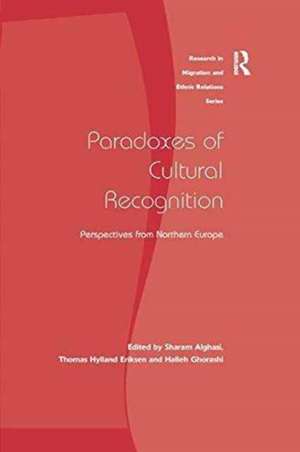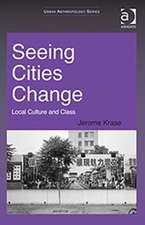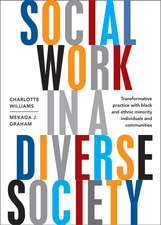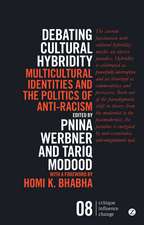Paradoxes of Cultural Recognition: Perspectives from Northern Europe
Autor Sharam Alghasi Editat de Thomas Hylland Eriksenen Limba Engleză Paperback – 17 noi 2016
| Toate formatele și edițiile | Preț | Express |
|---|---|---|
| Paperback (1) | 489.26 lei 43-57 zile | |
| Taylor & Francis – 17 noi 2016 | 489.26 lei 43-57 zile | |
| Hardback (1) | 1109.18 lei 43-57 zile | |
| Taylor & Francis – 27 mar 2009 | 1109.18 lei 43-57 zile |
Preț: 489.26 lei
Nou
Puncte Express: 734
Preț estimativ în valută:
93.65€ • 101.76$ • 78.72£
93.65€ • 101.76$ • 78.72£
Carte tipărită la comandă
Livrare economică 21 aprilie-05 mai
Preluare comenzi: 021 569.72.76
Specificații
ISBN-13: 9781138267770
ISBN-10: 1138267775
Pagini: 320
Dimensiuni: 156 x 234 x 20 mm
Greutate: 0.45 kg
Ediția:1
Editura: Taylor & Francis
Colecția Routledge
Locul publicării:Oxford, United Kingdom
ISBN-10: 1138267775
Pagini: 320
Dimensiuni: 156 x 234 x 20 mm
Greutate: 0.45 kg
Ediția:1
Editura: Taylor & Francis
Colecția Routledge
Locul publicării:Oxford, United Kingdom
Notă biografică
Sharam Alghasi is a PhD fellow at the University of Oslo, Norway Thomas Hylland Eriksen is Professor of Social Anthropology and Research Director of CULCOM at the University of Oslo, Norway. Halleh Ghorashi is Professor at the VU University Amsterdam, The Netherlands.
Recenzii
'This volume compares multiculturalist reasonings with national realities, mainly in Norway and the Netherlands, and it thus cuts a critical edge. Focusing on two proverbially liberal welfare states and civil societies, it contrasts them by factors ranging from moral (or moralizing) public policies to popular(-izing) moral panics. Importantly, its well-grounded ethnographies locate themselves in current conceptual and globally comparative contexts.' Gerd Baumann, University of Amsterdam, The Netherlands '...Paradoxes of Cultural Recognition gives the reader an accurate and disturbing update on the position of immigrants in Northern Europe and the need to tackle their alienation with future hope for a form of inclusion.' Nations and Nationalism
Cuprins
1: Introduction; 1: Uneasy Categories; 2: Engaging with Diversity; 3: Race and the Dutch; 4: Should Integration be the Goal? A Policy for Difference and Community 1; 5: National Identity and the Sense of (Non-) Belonging; 2: Cultural Categories in Practice; 6: Discrimination and Cultural Closure at Work; 7: Ethno-Nationalism and Education; 8: Avoiding Culture and Practising Culturalism; 9: Disentangling Culture as Explanatory Factor; 10: What Difference Does it Make? Transnational Networks and Collective Engagement Among Ethnic Minorities in Norway; 3: The Migrant's Positioning and the Public Space; 11: The Process of Hybridization; 12: ‘Mix, Just Mix and See What Happens'; 13: Fallen Angels; 14: Rethinking National Constellations of Citizenship; 15: Representations of the Other in Norwegian Debate Programmes 1989–1997; 16: From Obsessive Egalitarianism to Pluralist Universalism? A Normative Epilogue
Descriere
Explicitly comparative in its approach, Paradoxes of Cultural Recognition discusses central issues regarding multiculturalism in today's Europe, based on studies of Norway and the Netherlands. Distinguishing clearly the four social fields of the media, education, the labour market and issues relating to gender, it presents empirical case studies, which offer valuable insights into the nature of majority/minority relationships, whilst raising theoretical questions relevant for further comparisons.










